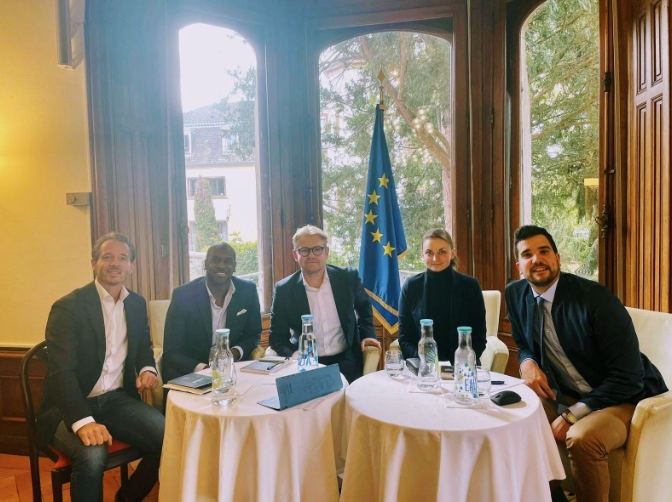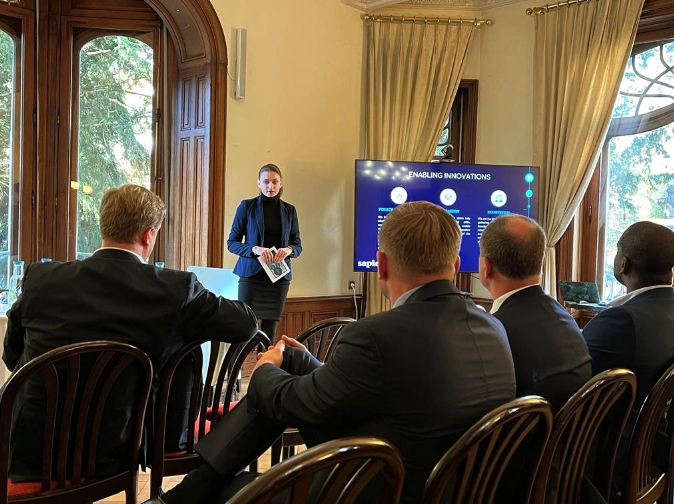Looking towards the Future of Work
On 17 – 18 October 2022, our team represented by Lucia Colníková, Head of the League for Digital Boost initiative, joined a first of the series of briefings, workshops and discussions on entrepreneurship, one-person companies (OPCs) and self-employment: status and trends focusing on digitalization, services and retailing.
The discussions took place at the European Parliament in Strasbourg and European Parliamentary Association Strasbourg and were hosted by MEP Angelika Winzig, Chair of SME Intergroup and Vice President of SME Europe. The list of guests also included MEP Maria Grapini, Vice-Chair of the IMCO Committee, MEP Ivan Štefanec, IMCP Committee Member, Horst Heitz, Chair of the Steering Committee with SME Connect, Michael Jäger, Secretary General of Taxpayers of Europe and CEO of the European Economic Senate, Laure Alexandre, Executive Director of the EU Direct Selling Association (Seldia), Johann Svane Jenses, Head of Policy at the Danish Entrepreneurs, Gori Yahaya, CEO and Founder of UpSkill Digital, Benoit Haecker, Country Director for France and Belgium at the Herbalife Nutrition, Thanos Moysiadis, EU Policy Director at Uber and other distinguished guests.
The two-day summit was a first event organized under the umbrella of the new SME Connect Initiative for Self-Employment and One-Person-Companies that is chaired by Ms Winzig and co-chaired by Ms Grapini.
Out of all SMEs, 93,1% are Micro Businesses, 60% of which are OPCs (One Person Companies). In 2021, 13% of employed people aged between 20-64 years in the EU were self-employed. Hence, the OPCs and the self-employed represent over 20% of employment in Europe. The trend has been fueled by the pandemic and the rise of remote work. At the same time, due to COVID-19, the self-employed and OPCs in particular have been disproportionately economically affected. When it comes to helping them, there is not enough exchange with their representatives at the EU level, in addition to lack of suitable contact points.
During the summit, we focused on how entrepreneurship can be better promoted (with emphasis on the self-employed, OPCs and micro and small businesses), we also tackled the issues of the impact of the coming critical months on entrepreneurs, digitization, and future of work.
The event gathered several representatives of the OPC and SME community as well. According to them, the most pressing issues of today are: energy prices, lack of employers and lack of trust and knowledge.
Micro and small businesses facing energy price increase have just few options – accept lower profit, try to pass as much as possible of the increase onto customers, cut jobs, or close the business. The possible solution has to be discussed on national as well as European level. One of the short-term options, however, could be to extend the price cap to the smallest enterprises, and treat cafés, bakeries, corner shops as if they were, in effect, households. And in practice, many of them really are. The regulations need to be improved and politicians across Europe have to discuss how to help the smallest businesses across Europe.
Entrepreneurs are thinking about increasing the implementation of digitalization in their business. However, first, they do not know where to start and who could help them. Secondly, in case they provide a service to customers, e.g. lessons of yoga, they fear that if they start to do it online, the income would decrease. They could just hardly imagine that even the price for an online lesson could be cheaper than for those provided in person, the compensation could return in a way that the number of people attending online will be higher, so the final income from one online lesson could be pretty much the same as the one taken in person. Thirdly, managers are not sure how to manage a situation when e.g. commercial agents providing service face to face will be replaced by online meetings only. Therefore, the question they asked themselves is how to transform, how many people should stay or should be fired because of digitalization as the digital tools could replace them. The solution could be simple. Just as every organization does a cost audit, each business should do an IT audit as well as skills audit. By doing this exercise, they would know exactly where to reallocate their internal capacities so they are beneficial for the growth of the business, but also growth of the employees. We are not robots and never would be, humans will be needed, just the character of the work would probably change.
Struggle to find experienced and skillful employers is really a case in number of EU countries. The problem is caused by several dimensions, out of which we touched upon two aspects. The first one is a massive brain drain. Talented and skilled young people are leaving the country, this is especially the case of the Central European and Balkan countries. Their final destinations are either Northern countries, Western Europe, UK, the US and others. And secondly, the level of digital skills across the population as such and willingness to increase their skill set. Basically, we can observe that the population is becoming overqualified, but underskilled. There are countless initiatives and organizations providing training, workshops, and having online academies to increase the digital skills. They know, if they do it right and provide the right support and education, it could return not only to them and their business, but also into the economy as such.
Although the number of SMEs, OPCs and entrepreneurs is really high, especially when you imagine the percentage of employment they cover, or the GDP income, according to the estimation by OECD from the year 2021, about 35 million of entrepreneurs are currently missing in the world and COVID made it even worse. These are those so-called missing entrepreneurs who cost economies ideas, innovation and jobs. The majority of them are women and those over 50 years old. Most people would rather be employers than entrepreneurs. This is not necessarily a case in digitally advanced countries like Finland or Denmark, and this phenomenon is just slowly changing in the rest of Europe. To better support the increase of entrepreneurship, it is important to promote it, to explain what it means, and that it is not necessarily only about big investments. Yes, the cash is what you need, but the entrepreneurship could be very diverse and it is open to every profile – men, women, young, elder, ethnical minorities. There are platforms providing guidance to future female entrepreneurs, young entrepreneurs, ethnical minority founders, entrepreneurs with a difficult social background etc. This is not discussed in Brussels and it is not covered during the discussions, but it could be part of the process. Diversity matters. It is also inevitable to talk about failure and to have the opportunities to fail, to learn from their own mistakes, or the mistakes of others, to share best practices, knowledge, and make connections. By doing all these things, it would lead to creation of a motivational and entrepreneurial environment, change of mindset and support the rise of entrepreneurship.
In order to make this right, however, we need to include those who we talk about into the processes and allow OPCs, SMEs and self-employed to raise their voice, be heard and provide their own feedback, share their fears, struggles, but also possible solutions, what regulations would help them and so on. This is also the reason why we joined this endeavor and started this long-distance run to support businesses.



